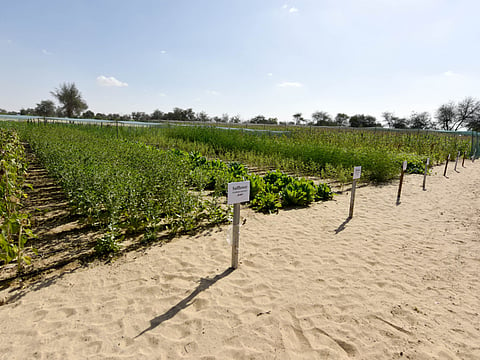Time to rework food security strategy
Countries need to do so not to be caught out by sudden shifts in trade flows or tariffs

Fruits and vegetables are not considered part of a country’s food security. This includes cherry tomatoes and avocadoes. They could, however, be grown and exchanged to achieve food security.
There seems to be confusion over what food commodities constitute a country’s food security and add to it… and those that do not. This confusion can be partly blamed on the relatively abundant, yet inaccurate, literature that associates food security with the number of calories that an individual consumes.
By adopting this measure, it does not matter what sources those calories come from. Hence, it could be fruits and vegetables; or protein-based, such as red and white meats; or cereals, specifically maize, rice, and wheat, which are responsible for 60 per cent of all calories consumed globally. Junk food counts too.
So where should food security come from?
Trying to subsist humans on a single calorie source would have both health and climatic ramifications. The former is a natural result of malnourishment while the latter is of a monoculture approach to growing food.
A balanced crop mix
The alternative should be the right mix of grains and proteins, rendering dairy products as supplementary, and fruits and vegetables as luxury. Therefore, a country’s attempt to focus its agricultural efforts on growing fruits and vegetables, in addition to expanding its dairy industry would only partially address its food insecurity, and that’s merely through the insufficient metric of calories per individual.
This of course does not mean that supplementary and luxury food commodities should be done without altogether. But it all boils down to what countries can produce to consume in addition to what countries can produce to export.
Growing to a country’s strength
This will in turn depend on the right mix of food commodities for each country. The mix must account for the country’s capabilities to grow food commodities that are food security related and ones that are not, consuming the first and exporting the second.
It should also take into account cultural preferences, not only for specific food commodities, like rice in the UAE and other Gulf countries, but also for very specific varieties. Understanding cultural preferences is also fundamental to why countries grow food commodities that will not be consumed domestically, and vice versa.
In Sudan, the staple food commodity is sorghum despite Sudan’s past efforts to expand wheat cultivation. Wheat on the other hand is the staple food in Pakistan, yet Pakistan is one of the largest growers and exporters of rice.
In Pakistan’s case, the focus on rice cultivation signals some sort of a comparative advantage in a tight international market, ensuring it can use proceeds from rice exports to purchase food and other commodities.
In fact, this ability to cultivate non-staple food commodities position countries favourably in today’s global food trade system, allowing them the freedom to improve their food security when needed through export bans as well as to increase their leverage with food importing countries.
Now for a country that cannot produce grains for instance or food commodities that are high in carbohydrates. The option to grow fruits and vegetables, if feasible, must not be overlooked. Similarly, countries could opt for a larger dairy sector if they could obtain a comparative advantage in it compared to other countries.
Both dairy and fruits and vegetables, including their by-products, can be then exchanged as high-value food commodities for ones that cannot be grown domestically, replacing imports of the same.
This approach to food security will only grow in importance for countries in the Middle East and North Africa (MENA).
Income and tariffs
Exporting fruits and vegetables will nonetheless be subject to income levels in importing countries along with cultural preferences for the same. Fruits and vegetables, compared to food security-related commodities like maize, rice, and wheat, are not food necessities.
Fruits and vegetables are also the easiest to ban or impose tariffs on whenever needed, with the impact varying based on how dependant the country is on their export income.
For example, the gap between suspending NAFTA and signing the new US-Mexico-Canada Agreement (USMCA) agreement raised avocado prices, and that in turn impacted the price of all meals that included guacamole. The threat of tariffs, post the signing of USMCA, also contributed to the price hike.
The notion to grow food commodities that are not food necessities is not a novel one. In fact, it was part of the push as countries wanted to modernise their agricultural sectors and to improve their fiscal situations. For reasons including policy mismanagement, this drive has been far from successful.
One food crisis after another, food-importing countries were left disadvantaged and unable to cope with rising food import bills, which in turn fuelled the following drive towards self-sufficiency. Countries that could produce food necessities or their preferred food staples did so, while others went on to pursue alternatives like fruits, vegetables and dairy products.
Such a trend is however not a sustainable one, and a change in preference could create national crises for countries that cannot pay for their food imports. Neither can they exchange high-value food commodities for them.
While there is no clear answer to what the solution for those countries looks like, the current presumption of situating themselves in the abovementioned market could serve the purpose in the short-term. However, and as global food security become a more critical issue for food growing and exporting countries such as India and China, the result would be an unprecedented surge in demand that will move food closer to the highest bidder.
The last thought that I want to leave you with: What will happen to food importing countries when growing populations limits countries’ capacity to export food necessities?
Abdulnasser Alshaali is a UAE based economist.



